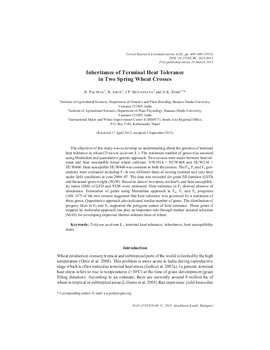Mostrar el registro sencillo del ítem
Inheritance of terminal heat tolerance in two spring wheat crosses
| Creador: | Paliwal, R. |
| Creador: | Arun, B. |
| Creador: | Srivastava, J.P. |
| Creador: | Joshi, A.K. |
| Año: | 2013 |
| URI: | https://hdl.handle.net/10883/21126 |
| Lenguaje: | English |
| Editor: | Akadémiai Kiadó |
| Editor: | Springer |
| Copyright: | CIMMYT manages Intellectual Assets as International Public Goods. The user is free to download, print, store and share this work. In case you want to translate or create any other derivative work and share or distribute such translation/derivative work, please contact CIMMYT-Knowledge-Center@cgiar.org indicating the work you want to use and the kind of use you intend; CIMMYT will contact you with the suitable license for that purpose. |
| Tipo: | Article |
| Lugar de publicación: | Szeged (Hungary) |
| Páginas: | 400-408 |
| Número: | 3 |
| Volumen: | 41 |
| DOI: | 10.1556/CRC.2013.0013 |
| Palabras Claves: | Heat Susceptibility Index |
| URI del Editor : | https://link.springer.com/article/10.1556/CRC.2013.0013#rightslink |
| URI del Editor : | https://akjournals.com/view/journals/0806/41/3/article-p400.xml |
| Descripción: | The objective of this study was to develop an understanding about the genetics of terminal heat tolerance in wheat (Triticum aestivum L.). The minimum number of genes was assessed using Mendelian and quantitative genetic approach. Two crosses were made between heat tolerant and heat susceptible bread wheat cultivars: NW1014 × HUW468 and HUW234 × HUW468. Heat susceptible HUW468 was common in both the crosses. The F4, F5 and F6 generations were evaluated including F1 in two different dates of sowing (normal and very late) under field conditions in year 2006?07. The data was recorded for grain fill duration (GFD) and thousand-grain weight (TGW). Based on data of two dates, decline% and heat susceptibility index (HSI) of GFD and TGW were estimated. Heat tolerance in F1 showed absence of dominance. Estimation of genes using Mendelian approach in F4, F5 and F6 progenies (148?157) of the two crosses suggested that heat tolerance was governed by a minimum of three genes. Quantitative approach also indicated similar number of genes. The distribution of progeny lines in F4 and F6 supported the polygene nature of heat tolerance. These genes if mapped by molecular approach can play an important role through marker assisted selection (MAS) for developing improved thermo-tolerant lines of wheat. |
| Agrovoc: | TRITICUM AESTIVUM |
| Agrovoc: | HEAT TOLERANCE |
| Agrovoc: | GENETIC INHERITANCE |
| ISSN: | 0133-3720 |
| Revista: | Cereal Research Communications |
Ficheros en el ítem
Este ítem aparece en la(s) siguiente(s) colección(ones)
-
Wheat
Wheat - breeding, phytopathology, physiology, quality, biotech

